小学六年级毕业考试英语复习资料汇总
川教版小学英语六年级毕业总复习资料
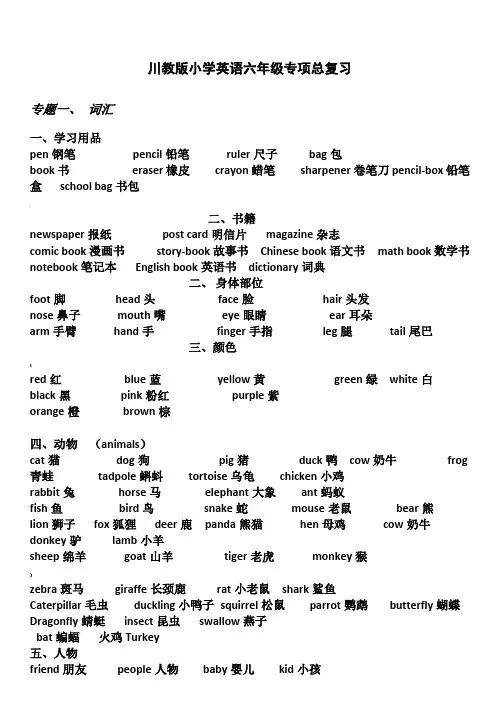
川教版小学英语六年级专项总复习专题一、词汇一、学习用品pen钢笔pencil铅笔ruler尺子bag包book书eraser橡皮crayon蜡笔sharpener卷笔刀pencil-box铅笔盒school bag书包.二、书籍newspaper报纸post card明信片magazine杂志comic book漫画书story-book故事书Chinese book语文书math book数学书notebook笔记本English book英语书dictionary词典二、身体部位foot脚head头face脸hair头发nose鼻子mouth嘴eye眼睛ear耳朵arm手臂hand手finger手指leg腿tail尾巴三、颜色$red红blue蓝yellow黄green绿white白black黑pink粉红purple紫orange橙brown棕四、动物(animals)cat猫dog狗pig猪duck鸭cow奶牛frog 青蛙tadpole蝌蚪tortoise乌龟chicken小鸡rabbit兔horse马elephant大象ant蚂蚁fish鱼bird鸟snake蛇mouse老鼠bear熊lion狮子fox狐狸deer鹿panda熊猫hen母鸡cow奶牛donkey驴lamb小羊sheep绵羊goat山羊tiger老虎monkey猴)zebra斑马giraffe长颈鹿rat小老鼠shark鲨鱼Caterpillar毛虫duckling小鸭子squirrel松鼠parrot鹦鹉butterfly蝴蝶Dragonfly蜻蜓insect昆虫swallow燕子bat蝙蝠火鸡Turkey五、人物friend朋友people人物baby婴儿kid小孩parents父母mother母亲father父亲mom妈妈dad爸爸grandparents 祖父母grandma/grandmother(外)祖母grandpa/grandfather(外)祖父aunt姑姑uncle叔叔sister姐妹brother兄弟son儿子daughter女儿man男人woman女人boy男孩girl女孩,Mr.先生Miss小姐Ms女士,夫人pen pal笔友student学生classmate同学水果类:Apple苹果orange橙子lemon柠檬peach桃子梨子pear 香蕉banana 葡萄grape 芒果mango草莓strawberry 樱桃cherry 荔枝litchis 西瓜watermelon,六、职业teacher教师student学生doctor医生nurse护士engineer工程师police警察cleaner清洁工worker工人driver司机farmer农民waiter服务员singer歌唱家writer作家actor男演员actress女演员artist画家policeman(男)警察postman邮递员TV reporter电视台记者七、交通工具bike自行车bus公共汽车train火车boat小船ship轮船car小汽车taxi出租车jeep吉普车Truck货车subway/地铁motor cycle摩托车plane飞机-八、地点/场所home家:room房间bedroom卧室bathroom卫生间kitchen厨房living room起居室washroom卫生间study书房school学校:classroom教室teacher’s office教师办公室Library图书馆art room绘画教室computer room计算机教室music room音乐教室playground操场canteen食堂Post office邮局police office警察局hospital医院factory工厂cinema电影院bank银行farm农场bookstore书店zoo动物园garden花园park公园pet shop宠物商店supermarket超市bookstore书店gym体育馆the Great Wall长城bus stop公交车站!country国家village乡村city城市hometown家乡九、课程Chinese语文math数学English英语课science科学Moral Education思想品德课Social Studies社会课.体育课music音乐art美术sports体育运动十、国家、城市(China/PRC中国America/USA美国England/UK英国Canada/CAN加拿大Australia澳大利亚New York纽约London伦敦Sydney悉尼New Zealand 新西兰France 法国Paris 巴黎Hong Kong香港Japan日本十一、大自然flower花grass草tree树seed种子plant 植物rose玫瑰leaf叶子rain雨cloud白云sun太阳wind风snow雪stream小溪river河流lake湖泊star星星moon月亮十二、星期)Mon. =Monday星期一Tues.= Tuesday星期二Wed.=Wednesday星期三Thur.=Thursday星期四Fri.= Friday星期五Sat.=Saturday星期六Sun.=Sunday星期天weekend周末week星期、周weekday工作日十三、月份Jan. (January) 一月Feb.(February)二月Mar.(March)三月April四月May五月June六月July七月Aug.(August)八月Sept.(September)九月Oct. (October) 十月Nov.(November)十一月Dec.(December)十二月十四、季节spring春summer夏fall/autumn秋winter冬十五、方位south南north北east东west西left左边right右边straight成直线的十六、患病have a fever发烧have a cold感冒have a cough咳嗽have a toothache牙疼have a headache头疼[have a stomachache 胃疼、肚子疼ill生病十七、数词:基数词one一two二three三four四five五six六seven七eight八nine九ten十eleven十一twelve十二thirteen十三fourteen十四fifteen十五sixteen十六seventeen十七eighteen十八nineteen十九twenty二十thirty三十forty四十fifty五十sixty六十seventy七十eighty八十ninety九十hundred百'序数词first第一second第二third第三fourth第四fifth第五eighth第八ninth第九twelfth第十二twentieth第二十thirtieth第三十fortieth第四十fiftieth第五十sixtieth第六十seventieth第七十eightieth第八十ninetieth第九十fifty-sixth第五十六十八、方位介词in在……里on在……上;在……时候under在……下面near在……的旁边behind在……后边next to与……相邻over在……上面in front of在……前面at 在……点!on the left在左边on the right在右边二十、心态情绪happy高兴的excited兴奋的angry生气的bored 无聊的sad悲伤的tired疲劳的二十一、动词过去式watch----watched 看wash---washed洗clean---cleaned打扫visit---visited看望do---did做go---went去!read---read读,看learn---learned学习eat---ate吃take---took照climb---climbed爬sing—sang唱歌dance---danced跳舞see---saw看见buy---bought买row—rowed划study---studied学习swim—swam游泳have—had有、吃return—returned归回fly---flew放prepare—prepared准备walk---walked步行jump---jumped跳leave---left离开play---played玩relax—relaxed放松get—got到达come—came来run—ran跑二十二、时间`表一般现在时:this morning(今天上午) this afternoon(今天下午)this evening (今天晚上) every day 每天表将来的:next week(下周) next weekend下周末next year明年next month下个月next Sunday下星期天表过去的:last weekend上个周末last week上周last year去年last month上个月last Sunday上个星期天three days ago三天前二十三、书籍comic book(漫画书) post card(明信片) newspaper(报纸) magazine(杂志)dictionary(字典)Chinese-book(语文书) English-book(英语书) math-book(数学书)note-book(笔记本) story-book(故事书) English-book(英语书)—二十四、Hobby(爱好)ride a bike--riding a bike(骑自行车) go swimming-- going swimming去游泳play the violin—playing the violin(拉小提琴)Fly a kite-flying a kite放风筝playing basketball打篮球二十五、第三人称单数Look-looks(看) feel-feels(感觉起来)smell-smells闻起来Taste-tastes尝起来sound-sounds听起来get-gets(到达,抵达)live –lives(居住) read--reads(读,看)teach--teaches(教) go--goes(去) watch--watches(看)>Do-does做have-has有,吃,喝二十六、形容词比较级更高的shorter更矮的younger更年轻的older更老的stronger更强壮的longer更长的smaller更小的更廋的hotter更热的bigger更大的fatter 更胖的更重的funny-funnier更有趣的easy-easier更容易的early-earlier更早的happy-happier更开心的pretty-prettier更漂亮的ugly-uglier更丑的更好的bad-worse更坏的expensive-more expensive更贵的difficult-more difficult更困难的二十七、三餐-breakfast早餐lunch午饭dinner晚饭二十八、疑问副词1.What is it(它是什么)2. What colour is it(什么颜色)day is it today(问今天星期几)’s the date today(问某月某日)’s the weather today(问天气)|is the matter with you你怎么了=What’s wrong with you is it(它怎样)time is it(几点)many boys are therein our class(我们班有多少个男生) much is the pen( 这只钢笔多少钱)How old are you(你几岁了)How about(怎么样)=what aboutWhen does she go to school(她什么时候去上学)Which dress is best(哪一条连衣裙最好)Where are you going(你将要去在哪里)Why do you like apples(你为什么喜欢苹果).Who is he他是谁Whose book is it它是谁的书When were you born你什么时候出生的二十九、频度副词(用在一般现在时态中)always(总是) usually(通常)often(经常)sometimes(有时候)never(从来不)三十、缩写形式:、1、. 上午2、.下午3、Entrance 入口4、Exit 出口5、1st第一2nd第二3rd第三4th第四7、What is=What’s 8、Who is=Who’s 9、can not=can’t10、do not=don’t 11、does not= does n’t 12、did not=did n’t13、you are=you’re 14、they are=they’re 15、I will=I’ll16、It is=it’s 17、She is=She’s 18、He is=He’s 19、I am=I’m食物:1、dumpling 饺子2、Zong Zi 粽子3、moon-cake 月饼[4、noodles面条5、fruit水果单位名称millimeter(mm)毫米centimeter(cm)厘米kilometer(km)千米foot英尺kilogram(kg)千克gram(g)克ton(t/tn)吨meter(m)米There Be 句型:1、A:Is there+单数名词……B:Yes,________No_________<2、A:Are there+复数名词……B:Yes,__________No,___________六年级上册句型1. How do you go to school (你怎样上学)I go by bike. (我乘自行车去。
六年级英语总复习资料内容
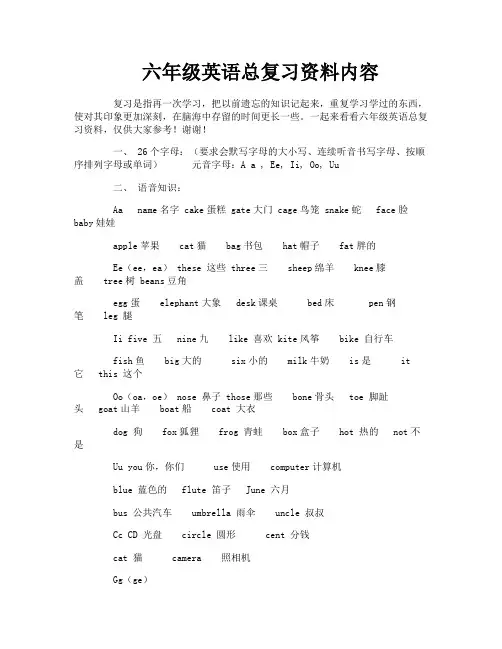
六年级英语总复习资料内容复习是指再一次学习,把以前遗忘的知识记起来,重复学习学过的东西,使对其印象更加深刻,在脑海中存留的时间更长一些。
一起来看看六年级英语总复习资料,仅供大家参考!谢谢!一、 26个字母:(要求会默写字母的大小写、连续听音书写字母、按顺序排列字母或单词)元音字母:A a , Ee, Ii, Oo, Uu二、语音知识:Aa name名字 cake蛋糕 gate大门 cage鸟笼 snake蛇face脸baby娃娃apple苹果 cat猫 bag书包 hat帽子 fat胖的Ee(ee,ea) these 这些 three三 sheep绵羊 knee膝盖 tree树 beans豆角egg蛋 elephant大象desk课桌bed床 pen钢笔 leg 腿Ii five 五nine九 like 喜欢 kite风筝 bike 自行车fish鱼 big大的six小的 milk牛奶 is是it它this 这个Oo(oa,oe) nose 鼻子 those那些 bone骨头toe 脚趾头goat山羊 boat船 coat 大衣dog 狗 fox狐狸 frog 青蛙 box盒子 hot 热的not不是Uu you你,你们use使用 computer计算机blue 蓝色的flute 笛子June 六月bus 公共汽车 umbrella 雨伞 uncle 叔叔Cc CD 光盘 circle 圆形cent 分钱cat 猫camera 照相机Gg(ge)orange 桔子 giraffe 长颈鹿page 页frog 青蛙 girl 女孩big 大的gate 大门th thin 瘦的 three 三thirteen 十三mouth 嘴mother 妈妈 father 爸爸 brother 兄弟 they 他们this 这个 that 那个feather 羽毛whwhat 什么 when 什么时候where 哪里why 为什么which 哪一个white 白色的water水 woman 女人walk 走who 谁whose 谁的ar car 汽车park 公园farm 农场arm手臂 star星星ir girl 女孩bird 鸟nurse护士purse 钱包 turtle 海龟third第三hurt 疼ow cow奶牛owl 猫头鹰house 房子mouse 鼠,鼠标cloudy 多云的oyoi boy 男孩 toy 玩具 oyster 贝壳oil 油coin 硬币 boil 沸腾oroor horse 马 store 商店 corn 玉米door 门floor 地板airear chair 椅子hair 头发 pear 梨bear 熊oobook 书 good 好的 look 看 foot 脚moon 月亮 food 食物pool 池子 room房间字母s或es的发音:字母s在词首发音为/s/, 在中间如:usually, television, treasure, casual中发音为/ /;以/p/, /t/, /k/ 清音收尾,读音为/s/;其他情况一般读音为/z/;以s, x, ch, sh 收尾加es的,es读音为/iz/。
小学六年级英语毕业复习资料【There-be-句型与have--has的区
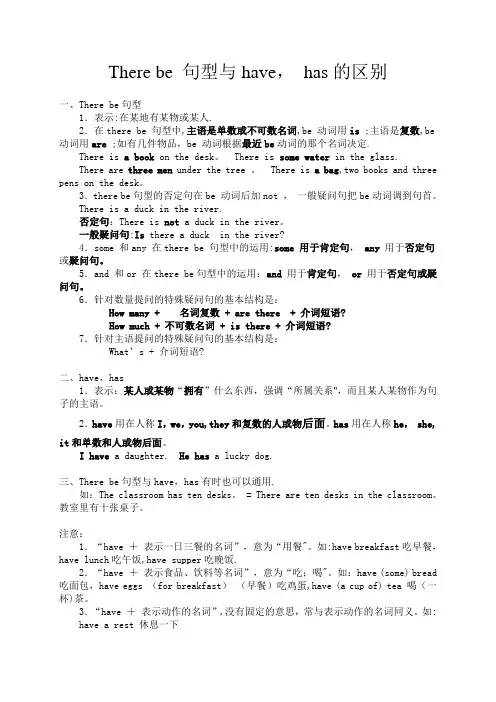
There be 句型与have,has的区别一、There be句型1.表示:在某地有某物或某人.2.在there be 句型中,主语是单数或不可数名词,be 动词用is ;主语是复数,be 动词用are ;如有几件物品,be 动词根据最近be动词的那个名词决定.There is a book on the desk。
There is some water in the glass.There are three men under the tree 。
There is a bag,two books and three pens on the desk。
3.there be句型的否定句在be 动词后加not ,一般疑问句把be动词调到句首。
There is a duck in the river.否定句:There is not a duck in the river。
一般疑问句:Is there a duck in the river?4.some 和any 在there be 句型中的运用:some 用于肯定句, any用于否定句或疑问句。
5.and 和or 在there be句型中的运用:and用于肯定句,or用于否定句或疑问句。
6.针对数量提问的特殊疑问句的基本结构是:How many + 名词复数 + are there + 介词短语?How much + 不可数名词 + is there + 介词短语?7.针对主语提问的特殊疑问句的基本结构是:What’s + 介词短语?二、have,has1.表示:某人或某物“拥有”什么东西,强调“所属关系",而且某人某物作为句子的主语。
2.have用在人称I,we,you,they和复数的人或物后面。
has用在人称he, she,it和单数和人或物后面。
I have a daughter. He has a lucky dog.三、There be句型与have,has有时也可以通用.如:The classroom has ten desks。
小学六年级毕业考试英语专项复习资料 首字母填空
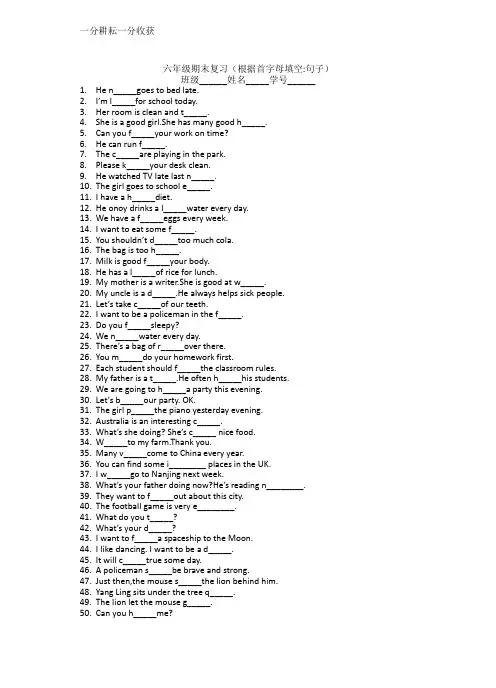
六年级期末复习(根据首字母填空:句子)班级______姓名_____学号______1.He n_____goes to bed late.2.I’m l_____for school today.3.Her room is clean and t_____.4.She is a good girl.She has many good h_____.5.Can you f_____your work on time?6.He can run f_____.7.The c_____are playing in the park.8.Please k_____your desk clean.9.He watched TV late last n_____.10.The girl goes to school e_____.11.I have a h_____diet.12.He onoy drinks a l_____water every day.13.We have a f_____eggs every week.14.I want to eat some f_____.15.You shouldn’t d_____too much cola.16.The bag is too h_____.k is good f_____your body.18.He has a l_____of rice for lunch.19.My mother is a writer.She is good at w_____.20.My uncle is a d_____.He always helps sick people.21.Let’s take c_____of our teeth.22.I want to be a policeman in the f_____.23.Do you f_____sleepy?24.We n_____water every day.25.There’s a bag of r_____over there.26.You m_____do your homework first.27.Each student should f_____the classroom rules.28.My father is a t_____.He often h_____his students.29.We are going to h_____a party this evening.30.Let’s b_____our party. OK.31.The girl p_____the piano yesterday evening.32.Australia is an interesting c_____.33.What’s she doing? She’s c_____ nice food.34.W_____to my farm.Thank you.35.Many v_____come to China every year.36.You can find some i________ places in the UK.37.I w_____go to Nanjing next week.38.What’s your father doing now?He’s reading n________.39.They want to f_____out about this city.40.The football game is very e________.41.What do you t_____?42.What’s your d_____?43.I want to f_____a spaceship to the Moon.44.I like dancing. I want to be a d_____.45.It will c_____true some day.46.A policeman s_____be brave and strong.47.Just then,the mouse s_____the lion behind him.48.Yang Ling sits under the tree q_____.49.The lion let the mouse g_____.50.Can you h_____me?51.The next day,two men c_____the lion.52.The students laugh l_____.53.The two boys b_____good friends at last.54.I can’t r_____the ball on the desk.It’s too high for me.55.They win the game.They are very e_____.56.He h_____an idea at last.57.He h_____the ball hard just now.58.There is not m_____juice in the fridge.59.There are many busy r_____in the city.60.You must walk on a zebra c_____.61.You must wait for the green m_____.62.You can wait on the p________.63.We must look at the t_____lights.64. He b_____ __ his t_____ __ in the morning and before bedtime.65. At home, Wang Bing a_____ __ puts his things in o_____.66. He sometimes f_____ s_____in the morning.67. Mike d_____ a lot of milk for b_____.68. D_____mike have a healthy diet?69. For l_____ and d_____ , Yang Ling eats some vegetables and some meat.70. I’m h_____, Mum.71. How can you c_____ the road s_____?72. Hi, Su Hai. This is Lucy. She’s a n_____student. Can you s_____ her around our school?73. You can wait on the p________.74. But it’s too deep. I can’t r_____ it.75. Liu Tao feels _____(sleep)in the morning.76. Look at those p_____ of our Earth.77. We use wood to m_____beds.78. Nancy g_____a red packet last Spring Festival.79. A: Where will you go for the summer holiday?B: I will go to Beijing by p_____.80. A: Will he s_____ in London for a month?B: Yes, he will.81. Miss Li is a_______ the s_____ about their dreams.82. D_____makes people h_____ and beautiful.83. Mike wants to be a dentist to t_____care of children’s t_____.84. Sam will do m_____sport to make him s______.85. I always have breakfast o___ time.86. He has many good h_____.87. My brother is going to buy some v________.88. A_______is a beautiful country in the world.89. What is your p_____for summer holiday.91. Be c_______!The floor is wet. Thank you.92 Don’t use too much p_____. It’s had for the earth.93.Today is June 1st . It’s C_________Day.94. May I ask you some q_________?95. We s_______talk in class.96. The sign on the wall m_____“keep quiet”.97. S_______ is the first day of a week.98. L ook! They’re t_______a walk.99. Yesterday my family a_____much nice food at home.100. The running race is very e_______.。
小学六年级英语总复习资料
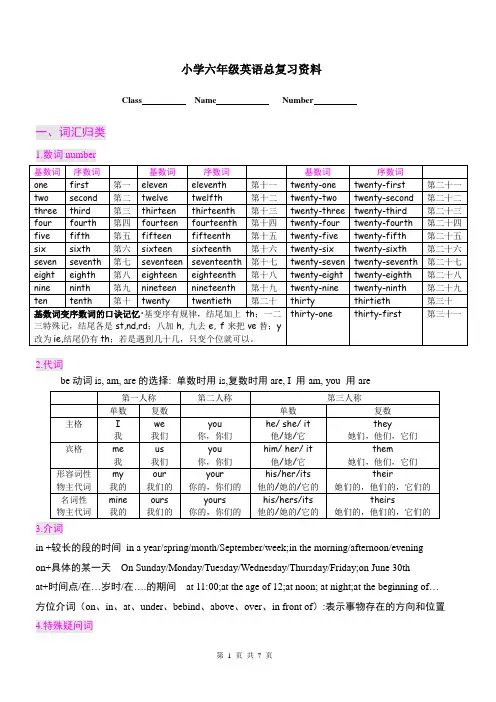
小学六年级英语总复习资料Class Name Number一、词汇归类1.数词number2.代词be动词is, am, are的选择: 单数时用is,复数时用are, I 用am, you 用are3.介词in +较长的段的时间in a year/spring/month/September/week;in the morning/afternoon/eveningon+具体的某一天On Sunday/Monday/Tuesday/Wednesday/Thursday/Friday;on June 30that+时间点/在…岁时/在….的期间at 11:00;at the age of 12;at noon; at night;at the beginning of…方位介词(on、in、at、under、bebind、above、over、in front of):表示事物存在的方向和位置4.特殊疑问词5.同音词I—eye, for—four, where—wear, pear—pair, see—sea, right-- write board—bored, sun—son, hour—our, one—won, here—hear, deer—dear, no—know, there—their, to-- too—two, by-- bye—buy6.缩写形式与完整形式isn’t=is not aren’t=are not I’m=I am it’s=it is can’t=can not could not=couldn’t she’s=she is he’s=he is you’re=you are we’re=we are don’t=do not doesn’t=does not they’re=they are what’s=what is who’s=who is that’s =that is did not=didn’t let’s=let us 二、Let’s spell三、语法点归类1.名词的运用单数名词:一般情况下用a可数名词以元音开头的单词用an (元音字母有:a e i o u)(如:an umbrella/ apple/egg/e-mail/ice cream/orange/umbrella/ elephant)复数名词:一般在词尾加s不可数名词如meat/milk/juice/water/tea/coffee/ soup2.名词单数变复数的规则3.形容词的比较级①形容词比较级的运用:将两个事物或人进行比较要用比较级,句型结构:4.四种时态(一般现在时、现在进行时、一般过去时、一般将来时)⑴一般现在时①用法:表示经常反复发生的动作、存在的状态或习惯性的动作的时态。
六年级英语毕业单词总复习(答案版)
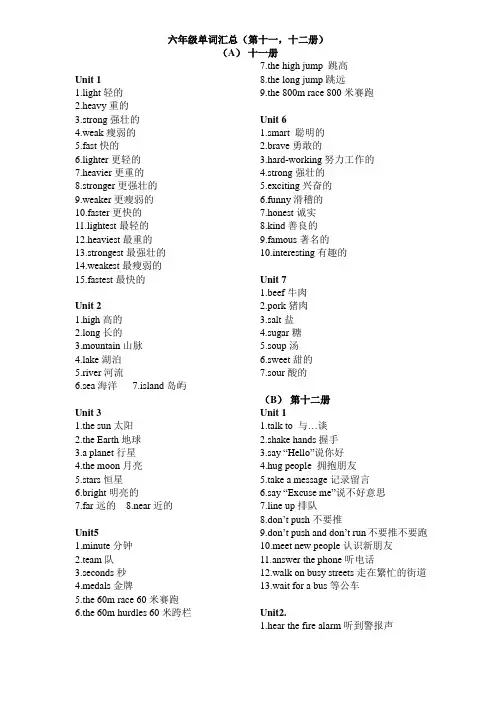
六年级单词汇总(第十一,十二册)(A)十一册Unit 11.light轻的2.heavy重的3.strong强壮的4.weak瘦弱的5.fast快的6.lighter更轻的7.heavier更重的8.stronger更强壮的9.weaker更瘦弱的10.faster更快的11.lightest最轻的12.heaviest最重的13.strongest最强壮的14.weakest最瘦弱的15.fastest最快的Unit 21.high高的2.long长的3.mountain山脉ke湖泊5.river河流6.sea海洋7.island岛屿Unit 31.the sun太阳2.the Earth地球3.a planet行星4.the moon月亮5.stars恒星6.bright明亮的7.far远的8.near近的Unit51.minute分钟2.team队3.seconds秒4.medals金牌5.the 60m race 60米赛跑6.the 60m hurdles 60米跨栏7.the high jump 跳高8.the long jump跳远9.the 800m race 800米赛跑Unit 61.smart 聪明的2.brave勇敢的3.hard-working努力工作的4.strong强壮的5.exciting兴奋的6.funny滑稽的7.honest诚实8.kind善良的9.famous著名的10.interesting有趣的Unit 71.beef牛肉2.pork猪肉3.salt盐4.sugar糖5.soup汤6.sweet甜的7.sour酸的(B)第十二册Unit 11.talk to 与…谈2.shake hands握手3.say “Hello”说你好4.hug people 拥抱朋友5.take a message记录留言6.say “Excuse me”说不好意思7.line up排队8.don’t push不要推9.don’t push and don’t run不要推不要跑10.meet new people认识新朋友11.answer the phone听电话12.walk on busy streets走在繁忙的街道13.wait for a bus等公车Unit2.1.hear the fire alarm听到警报声2.get up quickly快速起床3.leave the room 离开房间4.not take your things不要带你的东西5.not take the lift 不要乘坐电梯6.walk dowm the stairs quickly迅速下楼梯7.get out of the building走出大楼8.call 119打1199.firemen come消防员到来10.put out the fire灭火Unit 31.big大的2.small小的3.expensive 昂贵的4.cheap便宜的5.dictionary字典6.watch手表7.calendar日历8.beautiful漂亮的9.ugly丑陋的10.thick厚的11.thin薄的12.old旧的13.new新的14.notebook笔记本15.diary日记本Unit 51.bees and ants蜜蜂和蚂蚁2.amazing令人惊奇的3.work very hard工作很努力4.cheetahs猎豹5.exciting令人兴奋的6.run very fast跑的非常快7.turtles乌龟8.有趣的interesting9.walk very slowly走的很慢10.parrots鹦鹉11.clever 聪明的12.repeat well重复的好13.eagles鹰14.great伟大的15.see well视力好16.sharks鲨鱼17.dangerous危险的18.swim very quickly游的很快19.whales 鲸鱼20.surprising 惊讶的21.get very old寿命很长Unit 61.get a haircut 剪头发2.the hair salon美发沙龙3.meet a friend见朋友4.the Metro station地下铁5.do martial arts打武术6.the gym体育馆7.read a magazine读杂志8.patents父母9.read newspapers读报纸10.the library 图书馆11.hike远足12.Wutong Mountain梧桐山Unit 71.at midnight在午夜2.at home在家3.watch TV看电视4.at my cousin’s house在堂兄弟姐妹的房5.think about the new near畅想新年6.in bed在床上7.sleep睡觉8.wake koko up叫KOKO 起床9.bells ring钟声响起10.at the park在公园11.cheer欢呼。
(整理)小学六年级英语全套复习资料
英语复习资料教师版·复习资料(讲义·答案)·试卷分析(答案·分析)·学生资料(资料·卡表)小学六年级英语复习资料目录-------------第一部分复习资料1、一般过去时(讲义)............................................................................................................................................P1(答案)............................................................................................................................................P32、一般现在时(讲义)............................................................................................................................................P7(答案)............................................................................................................................................P93、一般将来时(讲义)............................................................................................................................................P17(答案)............................................................................................................................................P194、现在进行时(讲义)............................................................................................................................................P23(答案)............................................................................................................................................P255、There be (讲义)............................................................................................................................................P27(答案)............................................................................................................................................P296、情态动词(讲义)............................................................................................................................................P33(答案)............................................................................................................................................P357、时态对比(讲义)............................................................................................................................................P37(答案)............................................................................................................................................P418、比较级(讲义)............................................................................................................................................P49(答案)............................................................................................................................................P519、be 和do (讲义)............................................................................................................................................P53(答案)............................................................................................................................................P5710、人称和数(讲义)............................................................................................................................................P59(答案)............................................................................................................................................P6111、单词短语(答案)............................................................................................................................................P6512、教材知识整理............................................................................................................................................................P6913、英语作文(答案)............................................................................................................................................P7714、其他............................................................................................................................................................................P81 第二部分试卷分析1、期中检测试卷T2(答案)........................................................................................................................................P832、单元检测试卷R1(答案)........................................................................................................................................P87(分析)........................................................................................................................................P913、单元检测试卷R2(答案)........................................................................................................................................P93(分析)........................................................................................................................................P974、第一次模拟试卷(答案)........................................................................................................................................P99(分析)........................................................................................................................................P1035、第二次模拟试卷(答案)........................................................................................................................................P105(分析)........................................................................................................................................P1096、第三次模拟试卷(答案)........................................................................................................................................P111(分析)........................................................................................................................................P115第三部分学生资料1、学生读背句型............................................................................................................................................................P1172、学生错题卡................................................................................................................................................................P1213、学生单词错漏卡........................................................................................................................................................P123-------------一般过去时1 概念 表示过去某个时间里存在的状态 表示过去发生的事情和动作2 特征 was,were,would 等 yesterday,last week,last month,just now,...ago 等3 结构 be 动词:主语+be(was,were)+其它 行为动词:主语+行为动词(过去式)+其它4 例句 She was at home yesterday evening . He did his homework last night .be 动词(was,were) 行为动词(过去式) 1 肯定句 I was at home yesterday . I visited my uncle yesterday .He was excited yesterday evening .He did his homework last night . It was Ben ’s birthday last Friday . He worked in Shanghai ten years ago . We were busy just now . We went to zoo yesterday . They were in the gym just now . They played football yesterday .2 否定句 He was not in the park yesterday .He didn ’t do his home work last night . She wasn ’t at home yesterday evening . They didn ’t play football yesterday . We weren ’t busy just now . They didn ’t swim in the lake yesterday .3 特殊疑问句 Where was he born?Where did he go yesterday ? He went to Kunming . Who was at the zoo yesterday ?Who climbed mountains last weekend ? Tom climbed mountains. What day was it yesterday ? What did you do last night ? I went swimming. How was your school trip? How did you go to school this morning ? We went by plane . When was he born? When did you finish your homework? I finished it at 7 o ’clock.4 一般疑问句 Was he a pupil five years ago ? Yes ,he was . / No, he wasn ’t . Did he do his homework last night ? Yes, he did . / No, he didn ’t . He did his homework last night . Was she at home yesterday evening ? Yes ,she was . / No, she wasn ’t . Did John play computer games last night ? Yes, he did . / No, he didn ’t . John played computer games last night . Were they in Li Yan ’s home last night ? Yes ,they were . / No, they weren ’t . Did they play football yesterday ? Yes, they did . / No, they didn ’t . They played football yesterday . Were you busy just now ?Yes, I was . / No, I was n’t . Did you study English in 1990? Yes, I did . / No, I didn ’t . I studied English in 1990. Were you born in Shanghai? Yes, I was . / No, I was n’t . Did you read books yesterday ? Yes, I did . / No, I didn ’t .I read books yesterday. 否定句、特殊疑问句、一般疑问句some 改为any, and 改为or ,第一二人称互换注意1一般现在时常有标志词:yesterday,last week,just now,...ago 等 I got up at 6:00 yesterday .He played football last week . 2 前面使用助动词did, didn ’t, would, wouldn ’t 等,后面动词用原形 He didn ’t want to go shopping yesterday . What would you like for lunch?4 动词过去式没有人称变化 I visited my uncle yesterday . He visited my uncle yesterday .5 看准时态,区别现在进行时等 Tom sang a song just now. Tom is singing a song now .6 注意结构,避免漏掉动词What did he do last weekend?She went hiking last holiday. 7 注意原形,否定、疑问第二个动词 He didn ’t go to school by bike yesterday . Where did he go yesterday ?8 同一个主语第二个动词沿用形式 Tom got up at six and went to school at seven yesterday .He read books and wrote letters yesterday evening . 9 否定句、特殊疑问句、一般疑问句一二人称互换,some 改any, and 改or动词过去式变化1 一般情况 加“ed ” watch-watch ed look-look ed play-play ed2 不发音e 结尾 加“d ” like-like d live-live d use-use d3 辅音字母加y 结尾,改y 为i 加"ed " study-stud ied try-tr ied worry-worr ied *fly-fl ied /fl ew元音(a,e,i,o,u )字母加y 结尾看情况 stay-stay ed play-play ed*s ay -s aid buy-b ought 4 重读闭音节/r 双写末尾字母加“ed ” stop-stop ped plan-plan ned prefer-prefer red 即辅音+元音+辅音 5 不规则am/is-was eat-ate do-did see-saw go-went------------- 教材重现1 Book8 Unit3&4 What did you do last weekend ?I played football. 2 Did you help them clean their room? Yes, I did . 3What did you do yesterday ? I went fishing. 4 Did you read books?Yes, I did . 5 Did you clean your room?No, I didn’t .6 Where did you go on your holiday ? I went to Xinjiang.7 What did you do there? I sang and danced with my new friends. 8How did you go there?I went by train. 1 Book3 Unit5 What would you like for lunch? I ’d like some… 2 1 Book5 Unit3 2answer ed ask ed brush edcatch ed clean ed climb ed collect ed cook ed count ed finish ed fish ed guess ed help ed join ed jump ed kick ed learn ed listen ed look ed open ed pass ed perform ed plant ed reach ed row ed show ed snow ed talk ed touch ed turn ed visit ed walk ed wash ed watch ed work edclose d dance d hike d hope d like d live d love d move d recite dshine dskate dtaste duse dcarry carr ied cry cr ied fly fl ied/fl ew study stud ied worry worr ied play ed stay eddrive plan ned stop ped shop pedam are become begin buy build come cut do draw drink drive eat feelfind forget get give go have hear hide-hid hurt is keep know leave let makemeet put read ride run say see seek-sought sell send shut sing sit sleep sweep swim take teach tell thinkthrowwakewillwinwrite动词过去式的不规则变化1 改变动词中的元音 a w a ke-w o ke t a k e -t oo k we a r-w o re ea t-a t e dr a w-dr e w f a ll-f e ll 醒来 拿(衣服)穿(边)吃(边)画(直到太阳)落下 e g e t-g o t sp ea k-sp o k e forg e t-forg o t 到(某处)演讲 忘(词了)i beg i n-beg a n s i t-s a t dr i nk-dr a nk g i ve-g a ve wr i te-wr o te sw i m-sw a m w i n-w o n r i de-r o de s i ng-s a ng 开始 坐下 喝水 给(你)写信(告诉)游泳 赢了(要)骑车(去)唱歌o c o me-c a me kn o w-kn e w gr o w-gr e w bec o me-bec a me thr o w-thr e w 来(让你)知道(植物)生长 变化 (然后)扔出去 ur u n-r a n “跑了” 2 变词尾的“d ”为“t ” ben d -ben t sen d -sen t len d -len t buil d -buil t spen d -spen t 弯(腰)派(人)借(钱)建(造)来消遣 3 双“e ”改单后加“t ” sweep-swep t sleep-slep t meet-me t feel-fel t 打扫(后)睡觉(会)遇见(好)心情 4 与动词原形一样 put-put cut-cut hurt-hurt read-read cost-cost let-let get-get shut-shut 放(刀)切伤 读书(人)(要)花钱 让 得到 停止 5 变“ay ”为“aid ” s ay -s aid l ay -l aid p ay -p aid 说(给你)安排、补偿6采用不同词根think-th ought tell-t old teach-t aught buy-b ought sell-s old 想(着)告诉(你) 教(你做)买卖7 其他 am/is-was are-were have/has-had go-went do-did s ee -s aw hear-hear t find-f ound make-ma d e will-w ould leave-le ft (我们)是 有 去 做(坏事) 看(到)听(到)找(到)做(完)(后)将会 离开一般过去时练习一、填空(一)写出下列动词的过去式形式answer ed ask ed bec a me beg a n clean ed climb ed close d collect ed c a me cook ed count ed cut dance d dr e w dr a nk dr o ve ate f ou nd forg o t g o t g a ve help ed hide-hid hike d hope d hurt join ed jump ed ke pt kick ed learn ed le ftlet like d listen ed live d look ed love d ma d e me t move d open ed perform ed plan ned plant ed put read recite d r o de row ed r a n s aw seek-s ough t shine d shop ped show ed s a t skate d sle pt snow ed stop ped sw a m t ook talk ed taste d turn ed use d visit ed w o ke walk ed work ed wr o te brush ed catch ed d id finish ed fish ed go-went guess ed pass ed reach ed t aught touch ed wash ed watch ed carr ied fl ied / fl ew stud ied worr ied cr ied b ought play ed s aid stay ed ha s w oulds a ng w o n kn e w thr e w sen t buil t swe pt fe lt shut th ought t old hear t s old am-was is-was are-were (二)用动词的适当形式填空。
(1)小学六年级英语毕业复习资料【形容词、副词的比较级和最高级】
六年级英语毕业总复习(一)形容词、副词的比较级和最高级一、单词记忆趣味记单词draw 画画dance 跳舞rock 摇滚二、完全,缩略形式:I'm=I am he's=he is she's=she is they're=they are you're=you are there's=there isthey're=they are can't=can not don't=do not doesn't=does not isn't=is not aren't=are not let's=let us won't=will not I'll=I will wasn't=was not总结:通常情况下,'m即am,'s即is(但let's=let us), 're即are ,n't即not (但can't=can not) 三形容词(adj.)big大的small小的long长的tall高的short短的;矮的young年轻的old旧的;老的strong健壮的thin瘦的active积极活跃的quiet安静的nice好看的kind和蔼亲切的strict严格的smart聪明的funny滑稽可笑的tasty好吃的sweet甜的salty咸的sour酸的fresh新鲜的favourite最喜爱的clean干净的tired疲劳的excited兴奋的angry生气的happy高兴的bored无聊的sad忧愁的taller更高的shorter更矮的stronger更强壮的older年龄更大的younger更年轻的bigger更大的heavier更重的longer更长的thinner更瘦的smaller更小的三形容词、副词的比较级和最高级一般来说,中文意思是“……的”的词是形容词,而中文意思是“……地”的词是副词。
小学六年级英语毕业复习
小学六年级英语毕业复习资料一,词1,名词:可数时要注意以O结尾的名字的变化,“黑人英雄在火山下用土豆,西红柿和芒果打蚊子!”(NEGRO,HERO,VOLCANO,POTATO,TOMATO,MOSQUITO)这一类词是加ES,剩余大部分都是加S;2,不可数名词中要注意:SHEEP,DEER,FISH是单复同形。
八个国家的人记住口诀,中日两国永不变,英法变A为E。
其余都是加S。
八国:Englishman, Frenchman, American, German, Russian, Australian, Italian, Japanese.常见的不可数名词可以这样来记:金木水火土,肉面布食茶,液体粉末状,皆为不可数。
3,名词所有格:名词所有格,表物是谁的;①若为生词词,加‘S即可行,词尾有S,仅把‘(逗号)择,并列名词后,各自和共有;前者分别加,后者最后加;②若为无生命词,of 所有格。
解释:1,Jim’s book---吉姆的书。
James’book---名字后带S了,就直接打逗号。
Students’ books.2, Tim’s and Jim’s rooms (他们两各自的房间,2个房)Tim and Jim’s room (他们两共享的房,1个房间)4,冠词:a/an 的考法分为四点;⑴:a, e ,I ,o 元音音素开头的要用AN。
⑵:u 分为发/∧/ 时, an umbrella, an ugly boy.发/ju:/ 时, a university, useful book.⑶an honest boy/ hour H不发音⑷F,H,L,M,N,S,X,R 单独拿出来问时,用AN。
如: There is an “H” in the word hair.There is an “L” in the word lake.The的用法:独旧双方极乐序,姓形山河惯党团。
零冠词的用法:(不用THE的情况)人名国名抽象名,复数泛指都加零,季月节假日餐球,语言学科运动车。
部编版小学六年级英语总复习资料(含答案)
部编版小学六年级英语总复习资料(含答
案)
部编版小学六年级英语总复资料(完整版含答案)
此份资料包含小学六年级英语的全面复资料和答案,适用于部编版教材。
以下是资料的内容概述:
一、听力技能
资料中包括了六年级英语中所有的听力材料和练,旨在提升学生听力技能,让他们更好地理解英语。
二、阅读技能
复资料中有大量的阅读材料和题目,包括理解短文、填空、选择、判断等题型,涵盖了六年级英语中的各种语法和词汇知识点。
三、写作技能
资料中共有35个写作任务,每个任务包括了写作指导、范文和练题。
这些练旨在提高学生的写作能力,让他们能够独立地运用英语进行表达。
四、语言知识点
复资料中还包括了小学六年级英语的所有语法和词汇知识点,其中每个知识点都有详细的讲解和例句,并提供了丰富的练题,帮助学生巩固所学知识。
五、完整的答案
资料中提供了所有练题的答案,包括听力练和阅读练、写作和语言知识点的练,方便学生自行核对。
总的来说,此份资料是一份全面、详细的小学六年级英语复习资料,适用于需要全面回顾英语知识点的学生,也适用于备战期末考试的学生。
希望此资料能够帮助到大家。
- 1、下载文档前请自行甄别文档内容的完整性,平台不提供额外的编辑、内容补充、找答案等附加服务。
- 2、"仅部分预览"的文档,不可在线预览部分如存在完整性等问题,可反馈申请退款(可完整预览的文档不适用该条件!)。
- 3、如文档侵犯您的权益,请联系客服反馈,我们会尽快为您处理(人工客服工作时间:9:00-18:30)。
小升初小学六年级毕业考试英语复习资料汇总一学生易错词汇1、a, an的选择: 元音字母开头的单词用an,辅音字母开头的单词用a.2、am , is , are的选择: 单数用is , 复数用are. I 用am , you 用are.3、have , has 的选择: 表示某人有某物.单数用has , 复数用have. I ,you 用have .4、there is, there are 的选择:表示某地有某物,某人.单数用there is , 复数用there are.5、some, any 的选择: 肯定句用some, 疑问句和否定句用any.6、疑问词的选择:what (什么) who (谁) where (哪里) whose (谁的) why(为什么)when(什么时候)which(哪一个)how old (多大) how many (多少)how much(多少钱)二形容词比较级详解1.当我们需要对事物作出比较时,需要用到比较级。
比较级的句子结构通常是:什么+动词be(am,is,are)+形容词比较级+than(比)+什么,如:I'm taller and heavier than you. (我比你更高和更重)An elephant is bigger than a tiger. (一只大象比一只老虎更大)2.形容词的比较级是在形容词的基础上变化而来的,它的变化规则是:①一般的直接在词尾加er,如tall-taller,strong-stronger,②以e结尾的,直接加r,如fine-finer,③以辅音字母加y结尾的,先改y为i再加er,如funny-funnier④双写最后的字母再加er,如big-bigger,thin-thinner,hot-hotter☆注意☆比较的两者应该是互相对应的可比较的东西典型错误:My hair is longer than you. (我的头发比你更长)应该改为:练习:将单词heavy tall long big 改成适当的形式将句子填完整。
(1)How------------------------- is the Yellow River?(2)How-------------------------is Mr Green . He’s 175 cm.(3)How-------------------------are your feet? I wear size 18.(4)How-------------------------is the fish ? It's 2 kg.三动词过去式详解动词的过去式的构成规则有:A,规则动词①一般直接在动词的后面加ed:如worked , learned , cleaned , visited②以e结尾的动词直接加d:如lived , danced , used③以辅音字母加y结尾的动词要改y为i再加ed(此类动词较少)如study – studied carry – carried worry – worried(注意play,stay不是辅音字母加y,所以不属于此类)④双写最后一个字母(此类动词较少)如stoppedB,不规则动词(此类词并无规则,须熟记) 小学阶段要记住以下动词的原形和过去式:sing - ______ eat - ______ see - ______ have - ______ do - ______ go - ______take -______buy - ______get - ______read - ______fly - ______am/is - ______are - ______say - ______leave - ______swim - ______tell - ______draw - ______come - ______lose - ______find - ______ drink - ______ hurt - ______ feel - ______四动词现在分词详解动词的ing形式的构成规则:①一般的直接在后面加上ing , 如doing , going , working , singing , eating②以e 结尾的动词,要先去e再加ing ,如having , writing③双写最后一个字母的(此类动词极少) 牢记: running , swimming , sitting , getting五人称代词与物主代词1、肯定句: 是指用肯定的语气来陈述的句子,如:我是个学生。
她是个医生。
他在医院工作。
教室里有四台风扇。
他将在中午十二点吃饭。
我昨天晚上看电视。
2、否定句: 含有否定词或表示否定意义词的句子。
☆小结☆否定句主要是在肯定句的基础上加上了否定词"not".有动词be的句子则"not"加在be后面,可缩写成"isn't,aren't",但am not 一般都分开写。
没有动词be的句子则要先在主要动词的前面加上一个助动词(do,does,did),然后在它后面加上"not",也可以把它们缩写在一起如:"don't , doesn't , didn't ,这三个助动词要根据人称和时态来选择,其中"does"只用于一般现在时主语是第三人称单数的情况。
"did"只用于一般过去时,不论主语是什么人称和数,都用"did" .3、一般疑问句:是指询问事实的句子,此类句子必须用"yes",或"no"来回答.如:Are you a student?Is she a doctor?Does he work in a hospital?Are there four fans in our classroom?Are you going to buy a comic book tonight?Will he eat lunch at 12:00?Are they swimming?Did you watch TV yesterday evening?☆小结☆一般疑问句是在肯定句的基础上,①把动词be调到首位,其他照写,末尾标点符号变成问号即可②没有动词be的句子则要在句首加上一个助动词(do,does,did)再把紧跟在后面的动词变回原形,末尾标点符号变成问号即可.这三个助动词也要根据人称和时态来选择,其中"does"只用于一般现在时主语是第三人称单数的情况,而"did"只用于一般过去时,不论主语是什么人称和数,都用"did" .一般疑问句有个重要的原则就是问和答要一致,即问句里的第一个单词(助动词)和简略答句里的这个词是一致的.4、特殊疑问句:以特殊疑问词(what , where , who , which , when , whose , why , how)开头引导的句子.此类句子应该问什么就答什么,不能用"yes ,no"来回答.如:What is this?What does he do?Where are you going?Who played football with you yesterday afternoon?Which season do you like best?When do you usually get up?Whose skirt is this?Why do you like spring best?How are you?How did you go to Xinjiang?☆其中how又可以和其他一些形容词连用组成特殊疑问词组用来提问,如:how many 多少(数量;how much 多少(钱);how tall 多高;how long 多长;how big 多大;how heavy多重,如:How many pencils do you have?How many girls can you see?How many desks are there in your classroom?☆小结☆how many 用来提问可数名词的数量,主要有以上三种句式搭配,How many + 名词复数+ do you have 你有多少……How many + 名词复数+ can you see 你能看见多少……How many + 名词复数+ are there…有多少……七完全,缩略形式I'm=__________he's=__________ she's=__________ they're=__________ you're=__________ there's=__________they're=__________can't=__________don't=__________doesn't=__________isn't=__________aren't=__________let's=__________won't=__________I'll=__________wasn't=________☆小结☆通常情况下,'m即am, 's即is (但let's=let us), 're即are ,n't即not (但can't=can not)。
